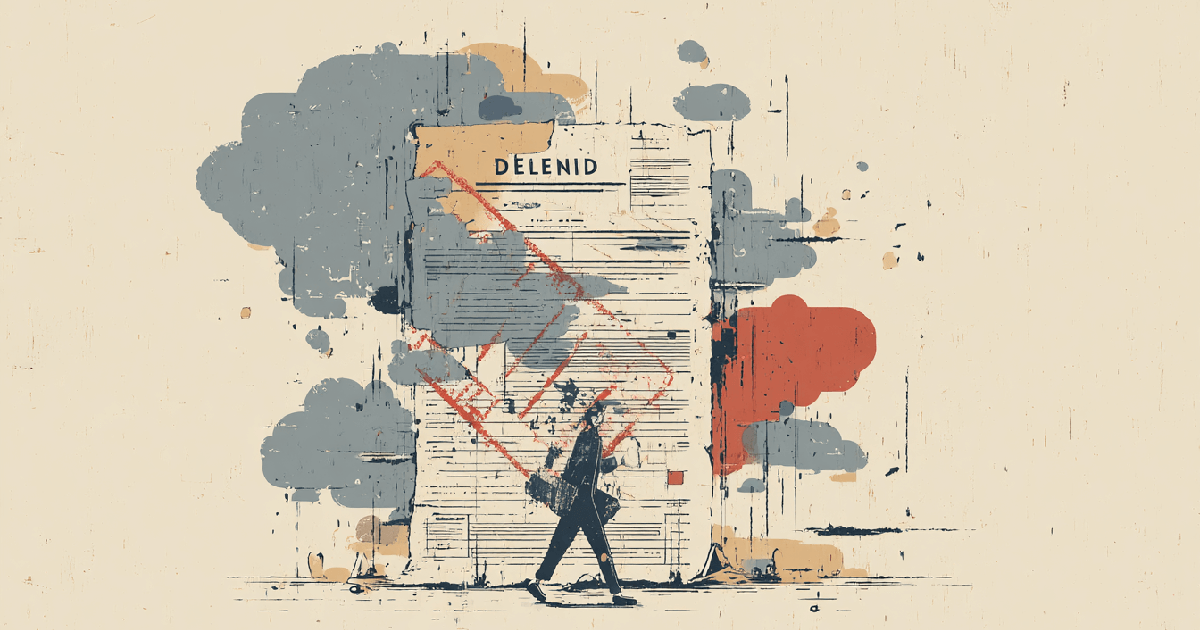What Is a Claim Denial?

A claim denial occurs when an insurance company rejects a policyholder’s request for coverage or compensation after an accident or injury. Denials can happen for various reasons, including lack of evidence, policy exclusions, or missed deadlines.
Why do insurance companies deny claims?
Insurance companies deny claims for several reasons, often citing policy limitations or procedural issues.
- Lack of coverage – The claim falls outside the policy’s terms and conditions.
- Insufficient evidence – Lack of medical records, police reports, or proof of liability.
- Missed deadlines – Failure to file a claim within the required time limit.
- Pre-existing conditions – The insurer argues the injury was not caused by the accident.
- Fraud or misrepresentation – Suspicions of false information or exaggerated claims.
What should you do if your claim is denied?
If an insurance company denies your claim, you have options to challenge the decision and seek reconsideration.
- Review the denial letter – Understand the specific reason for rejection.
- Gather additional evidence – Provide medical records, accident reports, or witness statements.
- File an appeal – Submit a formal request to have the decision reviewed.
- Seek legal assistance – A personal injury attorney can negotiate with insurers or file a lawsuit if necessary.
How can you prevent a claim denial?
Taking proactive steps when filing a claim can help reduce the risk of denial.
- Report the incident promptly – Notify your insurer as soon as possible.
- Document everything – Keep medical bills, accident reports, and communications with the insurer.
- Follow policy guidelines – Ensure compliance with your insurance policy’s requirements.
- Work with an attorney – Legal professionals can help build a strong case and avoid common pitfalls.
Conclusion
A claim denial can be frustrating, but understanding the reasons behind it and knowing how to challenge the decision can improve your chances of receiving compensation. Proper documentation and legal assistance can help policyholders navigate the appeals process successfully.
What is a claim denial?
A claim denial occurs when an insurance company refuses to pay a policyholder’s claim for coverage or compensation after an accident or injury. This can happen due to policy exclusions, insufficient evidence, missed deadlines, or other factors. Understanding why claims are denied can help policyholders take the necessary steps to challenge the decision.
Can you appeal a denied insurance claim?
Yes, most insurance companies allow claimants to appeal a denial. The process usually involves:
- Reviewing the denial letter to understand the specific reason for rejection.
- Gathering additional evidence, such as medical records, witness statements, or accident reports.
- Filing a formal appeal with supporting documentation.
Seeking legal assistance if the insurer refuses to reconsider.
Many claims are wrongfully denied, so an appeal can help reverse the decision.
How long do you have to appeal a claim denial?
The timeframe to appeal a denied claim varies by insurer and policy type. Many insurance companies require appeals to be submitted within 30 to 60 days of the denial notice. Missing the deadline can result in losing the right to challenge the decision, so it’s essential to act quickly and review the policy’s appeal guidelines.
What are common mistakes that lead to claim denials?
Several mistakes can increase the risk of a claim denial, including:
- Failing to report the incident on time – Delays in notifying the insurer can lead to rejection.
- Providing incomplete or inconsistent information – Missing details may weaken the claim.
- Not following medical advice – Gaps in treatment or failure to seek medical attention can be used to dispute the claim.
- Ignoring policy exclusions – Some claims are denied because they fall outside the policy’s coverage.
Avoiding these errors can increase the likelihood of a successful claim approval.
Featured Articles
-
Trial Law News
Did Clearpoint Cross the Line Into Unauthorized Practice of Law in an Arizona Foreclosure Case?
Did Clearpoint Cross the Line Into Unauthorized Practice of Law in an Arizona Foreclosure Case? A January 2026 court order from the United States.
-
Trial Law News
Could RICO Finally Hold Big Pharma Accountable for Hidden Drug Risks?
Could RICO Finally Hold Big Pharma Accountable for Hidden Drug Risks? In a groundbreaking development for pharmaceutical accountability, Wisner Baum LLP has pushed a.
-
Trial Law News
Law Firm Pushes Back on AI Accusations After Court Flags Faulty Citations
Law Firm Pushes Back on AI Accusations After Court Flags Faulty Citations A prominent law firm has denied using artificial intelligence to generate flawed.